In today’s competitive market, subpar content simply won’t cut it.
From improving audience retention and loyalty, raising brand awareness, and increasing conversions to building industry authority, and providing solutions to consumers’ most significant pain points, it should be no surprise that organizations experience 30% higher growth rates when they have a content strategy in place.
Yet, the success of a company’s content strategy all rests on the quality of its team.
What exactly does this mean? Just as quickly as it can improve leads, sales, and ROI, the adverse effects of a poorly structured content marketing team can be just as detrimental if not set up for success — including wasted resources, a negative brand reputation, and missed opportunities.
In this article, we’ll cover what content marketing is, why it’s fundamental to business success, and six crucial roles every content marketing team needs to succeed.
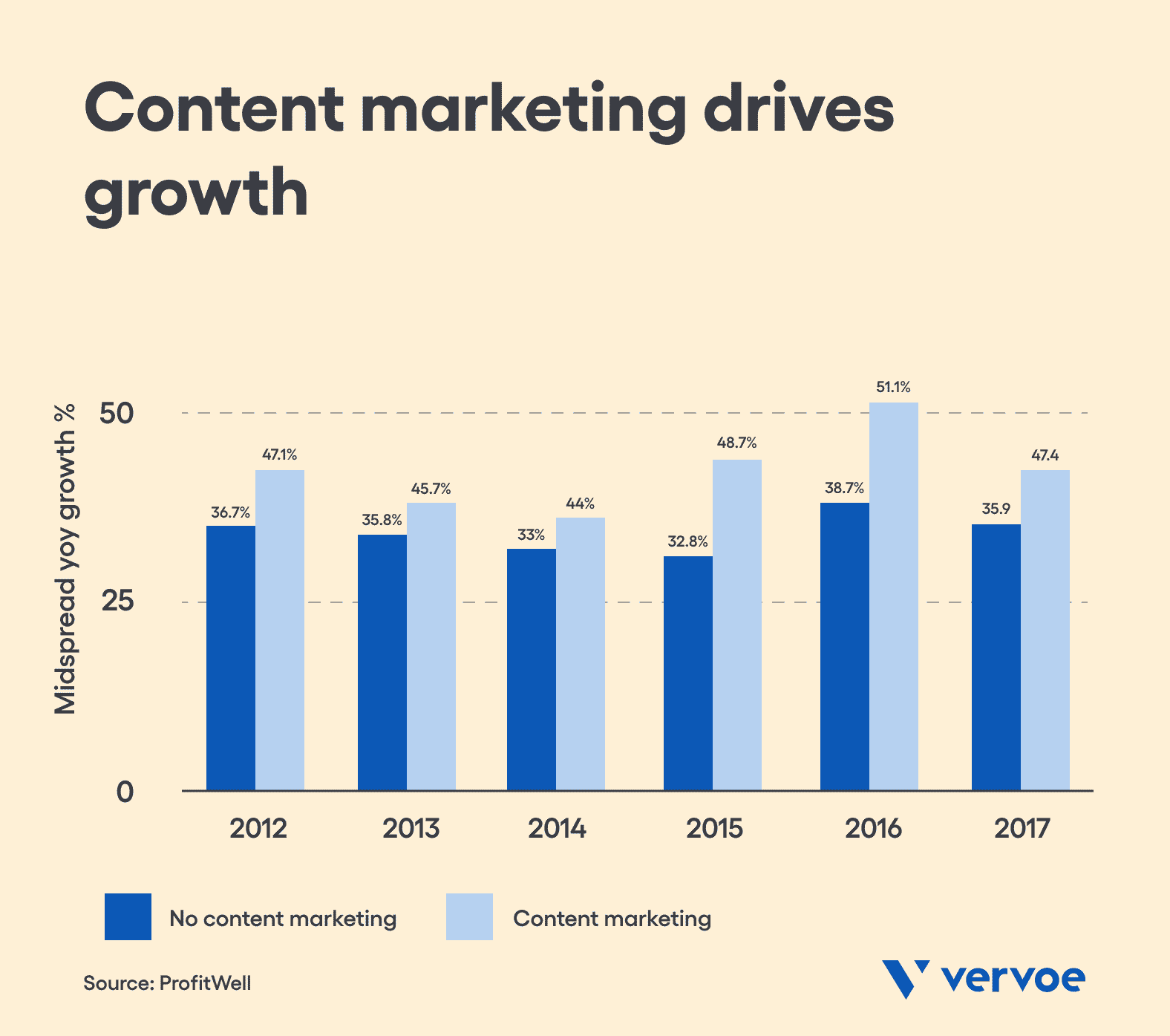
What is content marketing?
Content marketing is a function of marketing that seeks to attract, connect, engage, and retain customers through valuable content. This includes well-crafted product descriptions, articles, infographics, videos, white papers, newsletters, social media posts, case studies, eBooks, podcasts, and more.
Content marketing is generally a long-term strategy to improve brand awareness and customer connection to ensure the company remains top of mind when the audience is ready to sign up, buy, or subscribe. As we know, content builds relationships, and relationships build trust, which in turn encourages sales.
Why is content marketing essential to business success?
Content marketing demonstrates a brand’s values and identity, helping to position an organization as an industry expert.
It is responsible for providing context and answering questions consumers have about a product or service, which in turn builds trust and influences buying decisions.
Consider the following statistics from a ProfitWell Report on how consumers use content when looking to buy:
- 47% of consumers view three to five pieces of content before talking to a sales rep.
- Brands that prioritize blog writing receive 67% more leads than those without a blog.
- Companies that produce customer success-related content have a 5-10% better retention rate.
- Organizations with a strong content strategy experience 30% higher growth rates than those without a plan.
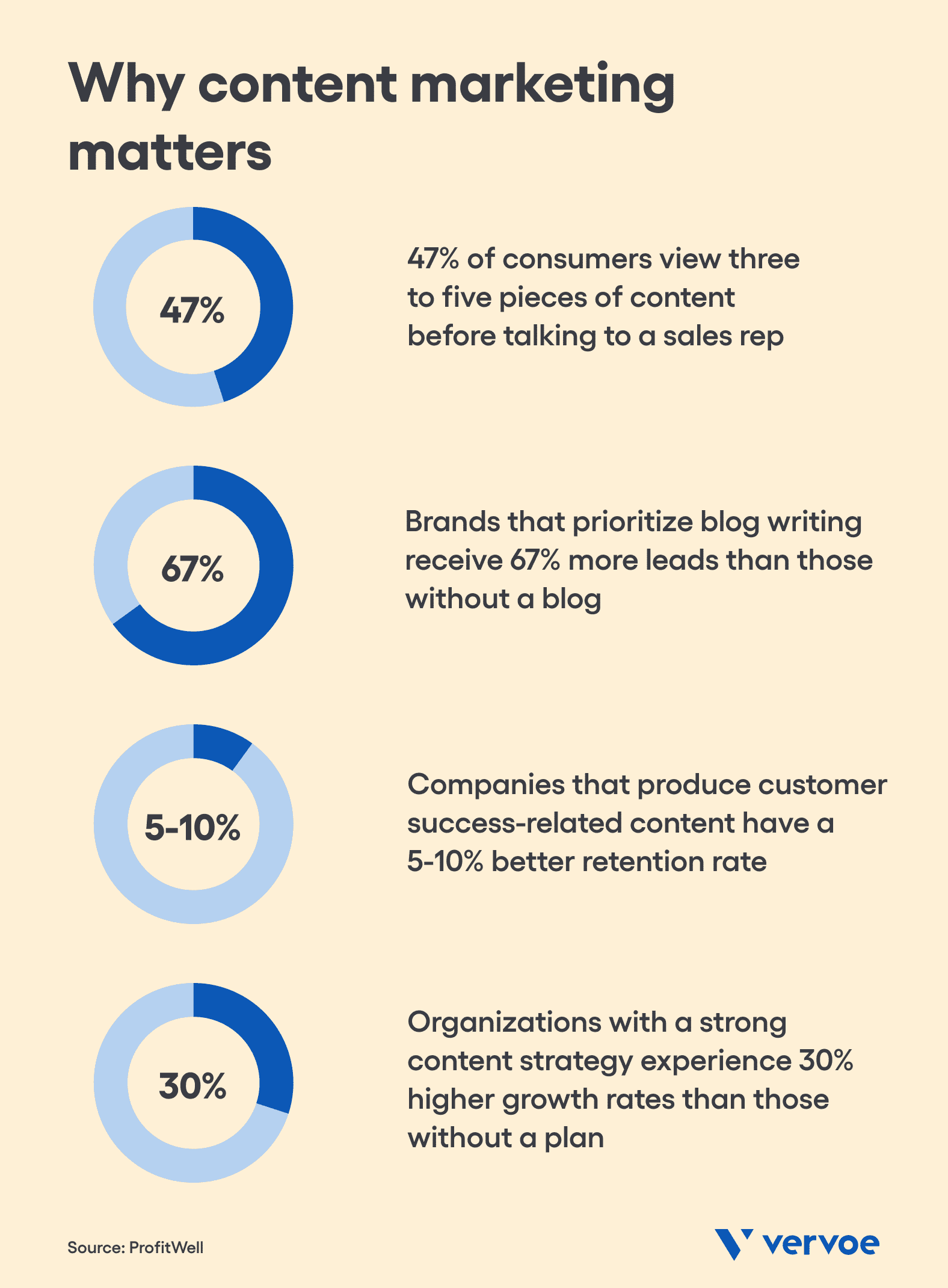
What does all of this mean? Content matters, but your strategy is only as effective as the structure of your content marketing team.
What to consider when designing your content marketing team structure
An organization’s content will largely be dictated by the industry they’re in and what its audience engages with (i.e., video content vs. written content). As a general rule, a content marketing team structure can generally fit into three categories: strategy, management, and creation. Let’s take a closer look.
Strategy
Relevant team members will look into brand opportunities, goals and insights, target market analytics, and SEO and PPC data to form the foundation of the content strategy.
Management
Team members in management positions will build a calendar/plan (i.e., content calendar, social media planner, etc.) following the overarching strategy and assign it to the relevant people.
Creation
The creative team (i.e., content creators, copywriters, etc.) will help execute the broader content marketing strategy by doing the groundwork — writing blog posts, creating videos, capturing social media content, designing graphics etc.
The ideal content marketing team structure
From content writing and creation to digital strategy and more, a successful content marketing team requires a variety of unique skills that work seamlessly together to amplify results.
At Vervoe, we believe the best content marketing team structure consists of the following roles:
Content marketing manager
To work with stakeholders and other teams to build the overarching content strategy, and to support team members in delivering upon the broader goals.
Social media manager
To drive engagement, produce visual content, analyze data and insights, and create a consistent online presence across all relevant social media channels.
SEO manager
To create and implement optimization strategies to improve a website’s search engine results and rankings, and to provide content insights regarding relevant topics and keywords.
PPC manager
To strategize and manage the organization’s Pay-Per-Click campaigns and spend, which includes evaluating channel strategy, monitoring competitors’ paid strategy, performing A/B testing, and more.
Copywriter
To cement the brand’s tone of voice and help execute the content marketing strategy developed by the content manager and stakeholders.
Graphic designer
To help create consistent branding across all elements of design to inspire, educate, and connect with the audience.
6 important roles fundamental to your content marketing team’s success
Let’s take a more in-depth look into how each of these critical roles work together, and how they contribute to high-performance content marketing.
1. Content marketing manager
Why is a content marketing manager important?
From liaising with the SEO manager to understand the direction to building a strategy and delegating and editing content created by the creative team, the content manager oversees the end-to-end content strategy.
Most importantly, a content manager plays a vital role in deciding the overall strategy for the content space and working with the relevant teams to help deliver upon this goal.
While this will depend on business size and structure, the content manager is generally a dedicated full-time role required in-house or potentially outsourced to an agency.
What is a content marketing manager responsible for?
This role is responsible for owning the content marketing space — from strategizing, writing, editing, and delegating to publishing, tracking, reviewing the strategy, and more. Although, it’s important to note that the content manager’s scope of responsibility will largely depend on the size and needs of the business.
While this will differ from business to business, a content manager may include the following responsibilities:
- Work alongside senior management to build a content strategy based on broader business and marketing goals and needs.
- Build a content calendar to help fulfill the overarching content strategy.
- Delegate content-related tasks to other employees in the content marketing team — i.e., copywriters, content creators, social media team, and graphic designers.
- Create content guidelines that dictate how the brand writes for internal and external channels.
- Write internal content and announcements to the team.
- Edit content — i.e., review articles, social media posts, product descriptions, etc.
- Publish content or assign the publishing to the relevant team member.
- Track relevant analytics to assess the success of the content — i.e., impressions, conversions, page views, organic rankings, etc.
- Alter the strategy as required.
What skills are required for a content marketing manager?
| Soft skills | Hard skills |
| Leadership Analytical Ability to work under pressure Mentoring/coaching Attention to detail Strategic and critical thinking Conflict resolution Decision making Listening and negotiating skills Organized Strong written and verbal communication | An understanding of copywriting Marketing analytics and data analysis An understanding of SEO principles Proficiency in marketing principles CMS proficiency — i.e., WordPress, Magento, Shopify, etc. |
How to hire the right content marketing manager
As an extremely influential role in the organization’s overall business success, it’s important to know why the role exists within your organization, what it will take a candidate to be successful in the role, and what unique hard and soft skills you feel your ideal candidate needs to possess. We recommend working backward and breaking down the key elements, responsibilities, and skills required to do the job well — as this will look slightly different for every business.
Our recommendations to ensure you find the most suitable content manager include:
1. Prioritize hard and soft skills in your job description
Use Vervoe’s free content marketing manager job description template to ensure you’re asking for the right skills, knowledge, and proficiencies.
2. Take candidates through a skills assessment
Vervoe’s skills assessments are designed to test a candidate’s job-ready skills as they apply to the role’s requirements. Through a range of question types — including video, audio, text-based, multiple choice, and more — Vervoe’s machine learning AI grades and ranks candidates’ responses based on the organization’s preferences and by benchmarking it against thousands of responses in our database to ensure accuracy. Vervoe offers completely customized assessments created from scratch or ready-made assessments for various roles. Organizations could use Vervoe’s content marketing manager skills assessment or director of content marketing skills assessment for this particular role.
2. Social media manager
Why is a social media manager important?
As the name suggests, a social media manager is responsible for building the social media strategy and calendar, implementing social campaigns, creating content, analyzing data, and making amendments accordingly.
The social media manager’s responsibilities will vary depending on your industry and company structure. However, they are generally required to drive engagement, create brand-aligned content, improve conversions, and create a consistent presence across all relevant social media channels — including Facebook, Instagram, TikTok, LinkedIn, YouTube, etc.
Why does all of this matter? Consider the following statistics from a Sprout Social poll that surveyed 1,000 consumers and 250 businesses:
- 55% of people learn about new brands on social media.
- 68% of respondents believe social media improves their brand interaction.
- 78% of respondents are more likely to purchase from a brand if they’ve had a positive experience with them on social media.
- 62% of respondents believe it’s important for businesses to have a strong social presence for long-term success.
- 72% of businesses use social media analytics to influence their business decisions.
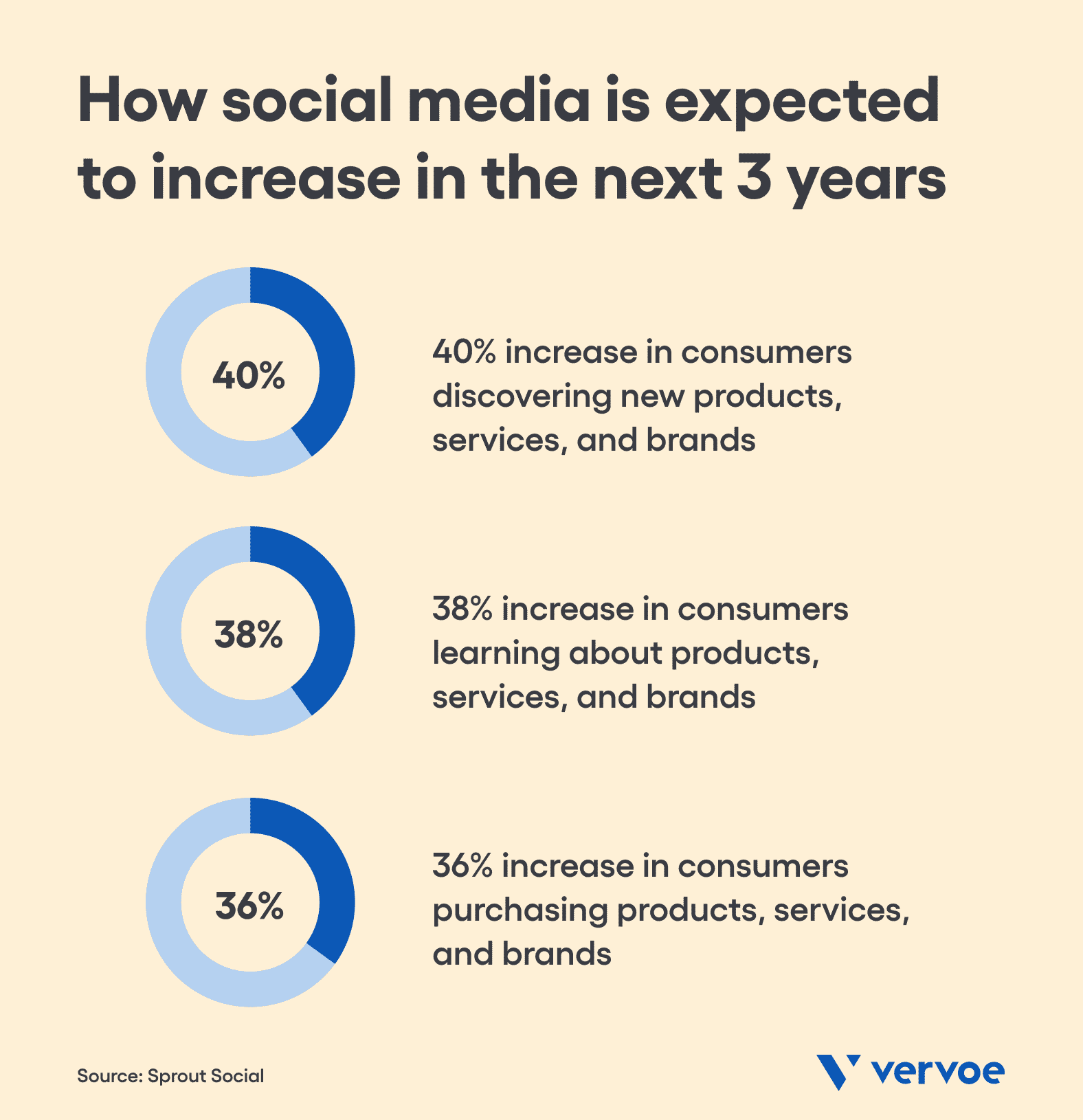
What is a social media manager responsible for?
The size of the company will largely influence the duties of a social media manager. For instance, a larger company will likely have a social media team, meaning the manager will look after the strategy and calendar and oversee the team’s work. In comparison, a smaller company may require them to look after all aspects of the social media space — from strategy to content creation.
As a general rule of thumb, a social media manager may be responsible for the following tasks:
- Create and implement the social media strategy and calendar — including creative ways to boost engagement (i.e., likes, comments, and shares), increase followers, and boost social traffic to the website.
- Ideate creative content ideas and create content (if required).
- Analyze data and report metrics.
- Make alterations to the social media strategy based on data.
- Stay up-to-date with the latest social media trends and relevant social media principles.
- Respond to customer feedback and queries (if required).
- Post and monitor social media platforms (if required).
- Craft engaging copy or work alongside the Copywriter to ensure copy is completed on time and to the brief.
- Analyze competitor activity.
- Liaise with external stakeholders such as digital agencies and influencers.
What skills are required for a social media manager?
| Soft skills | Hard skills |
| Leadership Critical thinking and problem-solving Strong written and oral communication Time management Creative Curious Collaborative Organized Customer service skills Attention to detail | Proficient in relevant social media channels — Instagram, Facebook, LinkedIn, TikTok, etc. Proficient in social media analytics and Google Analytics Strong understanding of social media KPIs |
How to hire the right social media manager
Sourcing the most suitable social media manager for your organization’s needs is most effective when using a skills-based approach:
1. Create a skills-based job description
Make the most of Vervoe’s social media manager job description template to ensure you’re focusing on the skills that matter and aren’t unintentionally screening out candidates before giving them a chance to prove their capabilities.
2. Advertise on the platforms your ideal candidate is likely to use
What better place to find the ideal candidate than by utilizing popular social media platforms they’re likely to frequent? According to a staff.com study, 73% of businesses have hired successfully with social media, 42% of companies believe candidate quality improves, and 20% say they filled roles quicker with social media recruiting. Social media recruiting is generally also more affordable than traditional recruitment, where certain job sites charge $0.25 – $1.50 per click.
3. Take candidates through a skills assessment
Utilize Vervoe’s ready-made social media manager skills assessment or create a custom assessment from scratch to test candidates’ job-ready skills as they apply to your role.
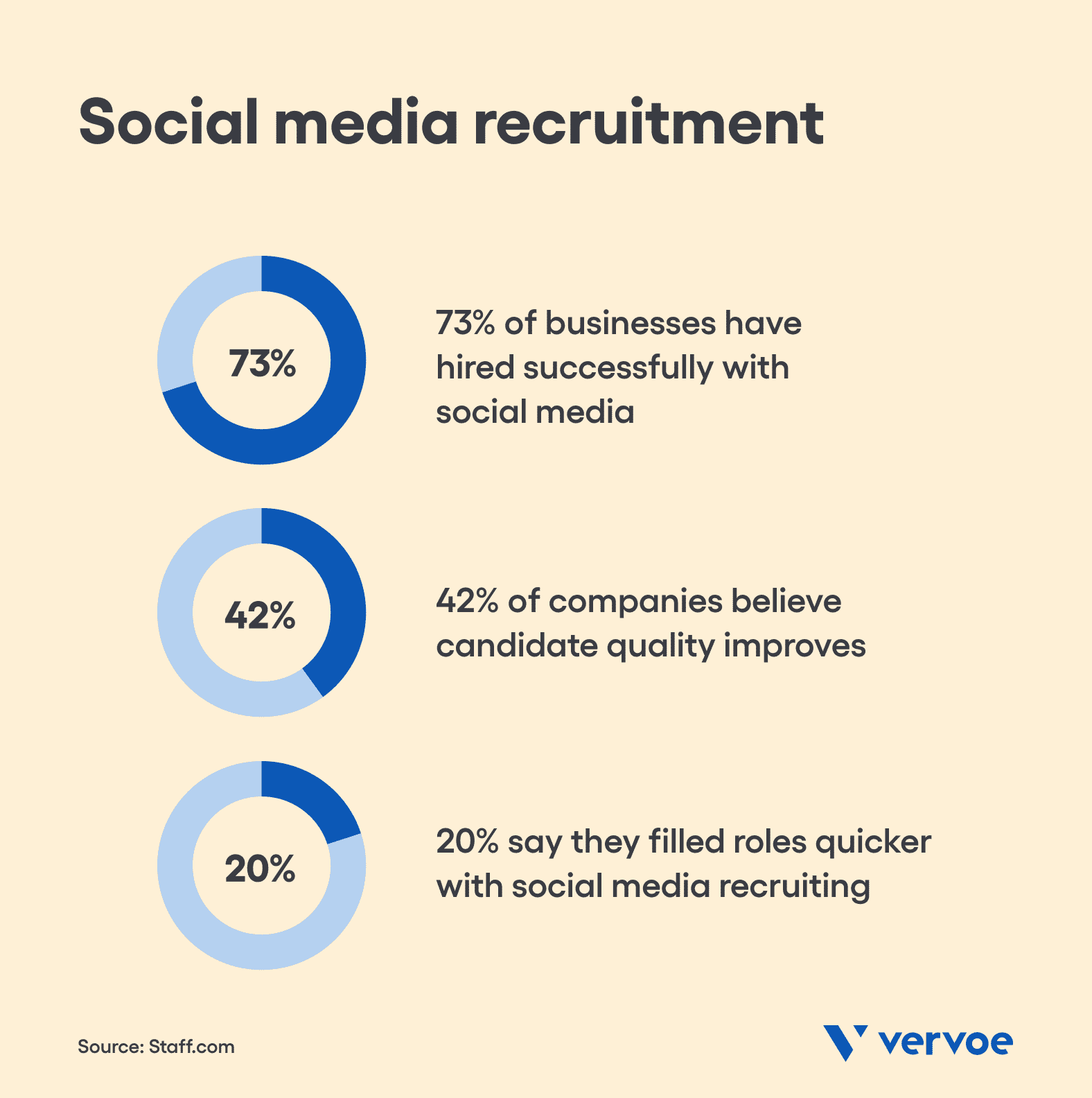
[Read more: How To Recruit and Hire With the Best Social Media Recruitment Strategies]
3. SEO manager
Why is an SEO manager important?
A Search Engine Optimization (SEO) manager uses analytics, insights, and marketing skills to improve an organization’s Search Engine Optimization and online presence.
Within the content marketing team, this role focuses on strategizing and employing tactics and tools to increase a company’s digital conversion rate and online presence. This includes but is not limited to increasing website visitors, improving organic search and rankings, conducting keyword research, ensuring on-page optimization for existing website pages, and more.
Prioritizing SEO is one of the essential roles in a content marketing team, helping to improve website visibility with tactics that boast long-term effects. While an organization is less likely to see instant results from SEO, it’s a long-term strategy that creates a strong foundation for any business. Thus, it’s crucial to find the right SEO manager or specialist.
What is an SEO manager responsible for?
While the requirements and responsibilities will vary among businesses, an SEO manager may be responsible for the following:
- Create and implement optimization strategies to improve a website’s search engine results and rankings.
- Collaborating with web developers and eCommerce teams to ensure SEO best practices are adhered to throughout the website.
- Manage SEO campaign expenses and tracking.
- Work alongside the content team to drive SEO practices and tactics in all relevant copy pieces, i.e., articles, landing pages, website copy, etc.
- Manage page optimization for search engine performance.
- Conduct regular keyword research and create content briefs to ensure high-ranking keywords are implemented in the content marketing strategy.
- Stay up to date with SEO best practices and strategies.
- Execute link-building strategy.
- Determine metrics to demonstrate success and conduct regular tracking and reporting.
What skills are required for an SEO manager?
| Soft skills | Hard skills |
| Time management Critical thinking Analytical skills Strong research skills Empathy Problem-solving | Proficient in Google Analytics Proficient technical, on-page, and off-page SEO knowledge and skills Basic HTML coding Proficient in keyword tracking JavaScript SEO knowledge |
According to SEMrush, the most sought-after SEO skills in the US are keyword research, technical SEO, HTML and CSS, Google tools, link building, on-page SEO, mobile SEO, and A/B testing.
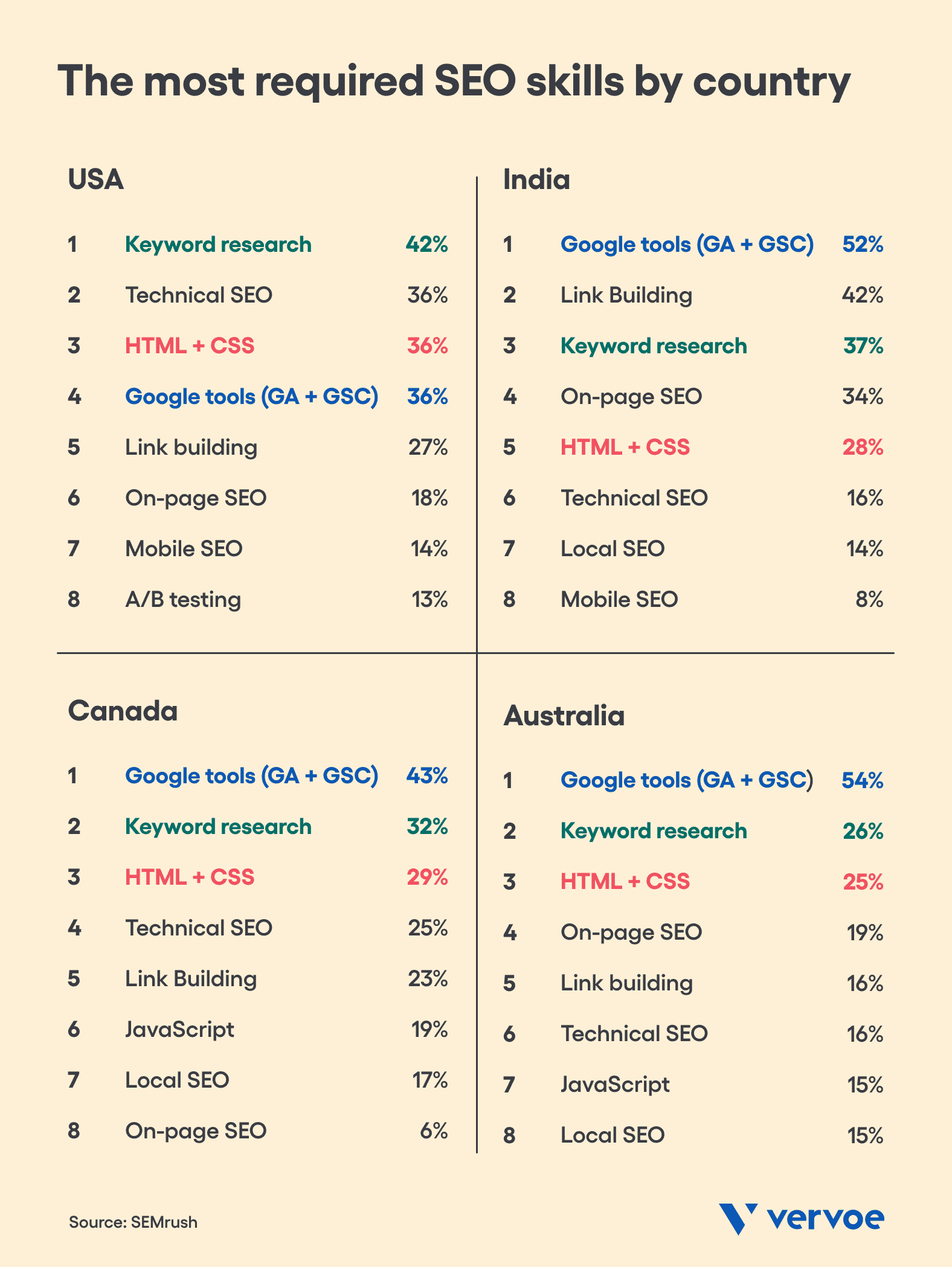
How to hire the right SEO manager
When finding the ideal SEO manager or specialist, we recommend using Vervoe’s skills-based approach:
1. Create a skills-based job description
Ensure the skills you require from candidates align with the role’s responsibilities, and eliminate anything that will not determine success in the role. This will open your position to a broader talent pool, giving you more opportunities to find the best candidate. Use Vervoe’s free SEO manager or SEO specialist job description template to help guide your job posting.
2. Take candidates through a skills assessment
Utilize Vervoe’s ready-made SEO manager skills assessment or SEO specialist skills assessment to help assess candidates’ hard and soft skills in relation to the job.
4. PPC manager
Why is a PPC manager important?
A Pay-Per-Click (PPC) manager is in charge of strategizing, overseeing, and managing an organization’s PPC campaigns and spend.
This will vary from company to company, but a PPC manager will generally work closely with the SEO manager to align strategies and findings. Like the SEO manager, the PPC manager plays a vital role in the overall content marketing team strategy by influencing content focus/topics, evaluating channel strategy, regularly monitoring competitors’ paid strategy, performing A/B testing, and reviewing ROI.
A PPC strategy is one of the most effective ways to see immediate results. I.e., an organization is essentially using paid tools and tactics to increase sales, generate more leads, and improve brand awareness. While SEO is the long-term approach, PPC boasts faster results. Thus, an essential part of any organization wanting to cut through the noise and have an impact quickly.
What is a PPC manager responsible for?
The company’s size will largely dictate the responsibilities of the PPC manager. However, here is a general overview of what a PPC manager’s duties might include:
- Create and deliver a paid campaign strategy for Facebook, Instagram, LinkedIn, and Google Ads products.
- Deliver exceptional paid results across all campaigns.
- Work alongside content creators and Copywriters to distribute high-quality content.
- Regularly monitor paid marketing metrics to assess the effectiveness of online advertising.
- Work alongside the SEO Manager to assess SEO and SEM strategies and effectiveness.
- A multi-channel approach – strong understanding of digital channel integration (PPC/Content/Social).
- Measure, analyze, and report on paid campaigns against goals (ROI and KPIs), providing data-rich campaign performance, insights, and recommendations.
- Analyze end-to-end consumer experience across digital channels.
- Keep up-to-date with the latest digital technologies and trends.
What skills are required for a PPC manager?
| Soft skills | Hard skills |
| Adaptable Curious Multitasker Forward-thinking Problem-solver Business-focused Analytical mind Time management Strong research skills | Strong understanding of digital channel integration (PPC/Content/Social) Proficient in Google Ads (Search, Display, YouTube, etc.) Proficient in Google Analytics SEO knowledge Keyword analysis Skilled in PPC strategies and principles Proficient in PPC tools |
How to hire the right PPC manager
We recommend following a skills-based approach to ensure you find the right candidate with the necessary skills needed to succeed in the role. A skills-based approach, when done right, also gives candidates a realistic job preview, improving retention and satisfaction. Here’s how to do it:
1. Create a skills-based job description
Use Vervoe’s PPC manager job description template to help guide what hard and soft skills are important in your role. This will help you better understand your ideal candidate, influencing what metrics are required for a candidate to succeed in the role.
2. Take candidates through a skills assessment
Utilize Vervoe’s ready-made PPC manager skills assessment. Or, if your company requires a combination of both skills, create a custom assessment from scratch to see how a candidate’s skills apply to the unique nature of your role.
5. Copywriter
Why is a copywriter important?
Copywriting plays a fundamental role in the content marketing team. While the content manager is responsible for creating the strategy and building the content calendar, the copywriter is responsible for delivering the finished product.
The copywriter works with the content manager to deliver content that speaks to the broader strategy. Depending on the size and structure of the business, the copywriter may also liaise with the SEO manager to implement relevant strategies to improve on-page SEO.
Given the nature of the role, copywriters can work full-time or part-time in-house, depending on the organization’s needs, or outsourced to an external agency or freelancer, should copy only be required on a needs basis.
According to Databox findings, written forms of content (i.e., blogging) represent the most significant investment for organizations, followed by video, eBooks, podcasting, and webinars.
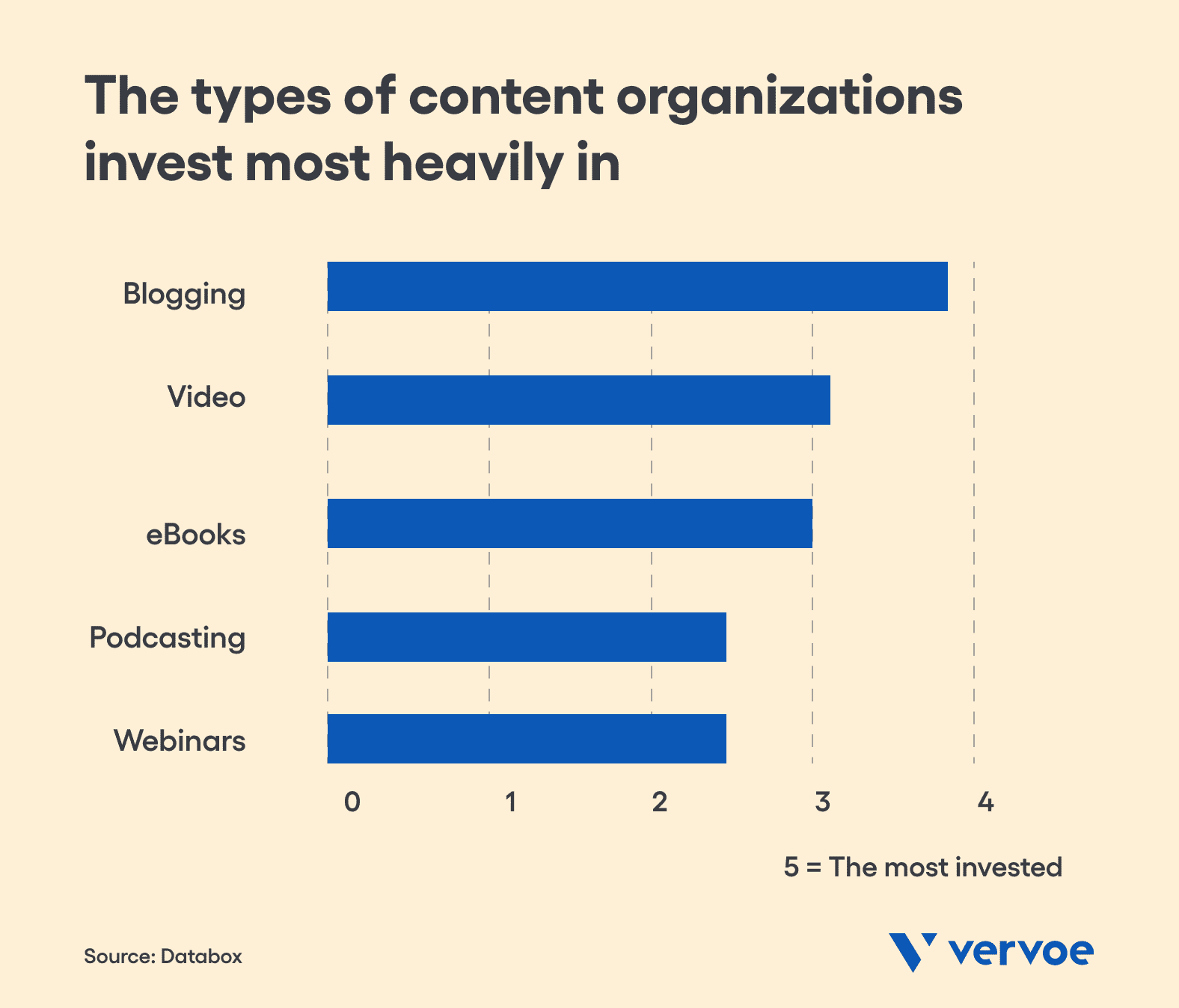
What is a copywriter responsible for?
As the title suggests, a copywriter is responsible for all written content — including internal communication and resources and external customer-facing content.
While this will differ from business to business, a copywriter may include the following responsibilities:
- Proofread and subedit a range of content.
- Research subject matters.
- Write engaging copy for various mediums and collateral — including articles, product descriptions, headlines, eBooks, social media posts, white papers, etc.
- Ensure a consistent tone of voice across all content and communication.
- Interpret creative briefs and develop them into copy concepts.
What skills are required for a copywriter?
| Soft skills | Hard skills |
| Critical thinking Empathy Creativity Curiosity Strong verbal and written communication Problem-solving Strong researching and interviewing skills Editing | Proficient writing skills Language skills Proficient in grammar, punctuation, and spelling An understanding of SEO CMS proficiency — i.e., WordPress, Magento, Shopify, etc. |
How to hire the right copywriter
The ideal copywriter will look different in every business. Depending on your industry, the goal might be to find someone to create high-volume content, high-quality long-format copy, help unify your brand voice, or craft technical copy with a high level of detail and niche knowledge.
As such, finding the ideal copywriter will require you to gain a deep level of understanding of what the role looks to achieve. Consider the following questions when hiring:
- What is the primary goal of the role?
- What does success look like for the position?
- What hard and soft skills are required for a candidate to do the job well?
- What is the candidate’s writing process — how do they like to research and produce content? What tools do they use?
When finding the ideal copywriter, we recommend using Vervoe’s skills-based approach:
1. Create a skills-based job description
Look at the hard and soft skills required for the candidate to succeed and use these as the foundation of your job description — source inspiration from Vervoe’s free copywriter job description template.
2. Take candidates through a skills assessment
Create a customized Vervoe assessment from scratch that’s unique to your business needs, or utilize Vervoe’s ready-made content writer skills assessment or copywriter skills assessments. These skills-based assessments are designed to take your candidates through a job simulation to understand better whose skills best align with your role requirements and to provide a realistic job preview to ensure candidates understand the expectations.
6. Graphic designer
Why is a graphic designer important?
Graphic designers are visual storytellers responsible for communicating a brand’s personality through design elements. A graphic designer plays an essential role in inspiring, informing, and connecting with your audience through images or graphics. Often described as the combination of art and technology, a graphic designer is responsible for creating design elements for websites, logos, social media posts, advertisements, brochures, eBooks, magazines, presentations, and more.
Why is graphic design fundamental to a content marketing team’s success? This role is responsible for adding to your company’s identity by adhering to brand guidelines to ensure branding remains consistent across all visuals, from print to digital. This creates an association, helping customers recognize your brand through distinct visual elements.
What is a graphic designer responsible for?
Like all roles, a graphic designer’s scope of responsibility is influenced by the business’s needs and the company’s structure. However, here are typical graphic design responsibilities:
- Liaise with the content marketing team to understand requirements, desired outcomes, and timelines.
- Develop concepts, graphics, and layouts for different visual campaigns.
- Ensure all design work aligns with brand guidelines.
- Create designs for various mediums and channels, including web page layout, logos, article graphics, social media visuals, and print campaigns.
- Stay up-to-date with design principles and software trends.
What skills are required for a graphic designer?
| Soft skills | Hard skills |
| Adaptable Creative Time management Strong communication skills Idea generation Attention to detail Problem-solving | Proficient in Adobe Suite — Photoshop, Illustrator, InDesign etc. Strong understanding of typography Proficient in digital design — UI, UX, Sketch, etc. (if required) Basic coding skills (if required) Strong understanding of branding Strong understanding of design principles |
How to hire the right graphic designer
We recommend following a skills-based approach to ensure you find the right candidate with the necessary skills needed to succeed in the role. A skills-based approach, when done right, also gives candidates a realistic job preview, improving retention and satisfaction. Here’s how to do it:
1. Create a skills-based job description
Break down what your graphic designer is responsible for (i.e., print and digital design, predominantly social media design, etc.) and work backward to understand the important soft and hard skills needed to succeed in the role. This may include specific software skills or unique branding principles. From there, create a job description that looks at the skills needed and removes all other requirements that may act as a barrier (i.e., a college degree). Vervoe’s graphic designer recruitment guide may be handy when considering what’s important.
2. Take candidates through a skills assessment
Create a customized Vervoe assessment using a range of question types — including text-based, multiple choice, audio and video — to create an experience that tests how candidates will perform the day-to-day tasks. To test graphic designers, you can ask questions that test their attention to detail, communication style, how they receive feedback, and you can even get them to upload designs in Vervoe according to a brief.
Final Thoughts
The success of your company all comes down to the people you choose to hire — particularly your content marketing team structure.
As one of the most important functions of a business, your content marketing team plays a crucial role in connecting with your audience, giving your brand depth, enhancing your brand personality, and most importantly, converting your audience to loyal customers.
And we believe a content marketing team is most successful when it combines the skills of a content marketing manager, SEO manager, social media manager, PPC manager, copywriter, and graphic designer.
Yet, Rome wasn’t built in a day, nor will your dream team. We recommend getting started on developing your content marketing team structure by creating an overarching content marketing strategy first, hiring the relevant roles over time, encouraging the balance between team collaboration and autonomy, and selecting your ideal candidates intentionally with a skills-based approach to hiring.
To build a high-performance content marketing team structure, utilize Vervoe’s skills assessments. Book in a demo today to learn how you can add confidence to your hiring decisions. Or start using Vervoe right now by picking the right plan for you.




















